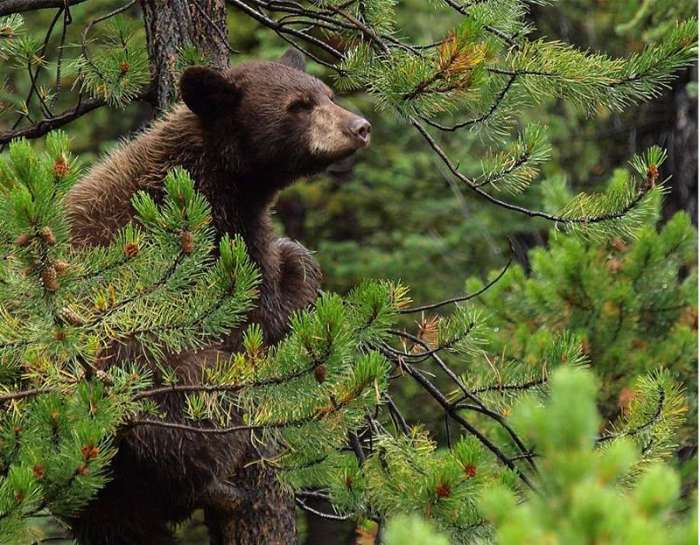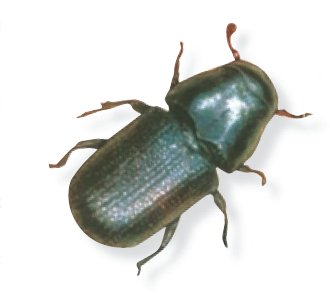


NO. Just moving around. It would be very nice to think that their cycle is ending. However, we talk to the Forest Service and other people all over the Western US.
While Bark Beetles have been around for millennia, and while they have been known to cycle through the forest periodically, there are factors at play that have not previously been so prevalent. Because forest temperatures are warming, the beetles are not being frozen out during the coldest part of the winter. Warming temperatures also bring draught. Draught is weakening trees, which then become more susceptible to beetle-born disease. For these reasons, there seems no end in sight until the trees are gone unless we protect the forests.
Conventional wisdom has stated that Mountain Pine Beetles have a one year life cycle in most of the Rocky Mountains. In late summer (usually June-July-Aug in Rocky Mountain States and BC) the newly hatched adults leave the tree of their metamorphosis, seeking out larger trees in the surrounding area. When the adults arrive, they begin tunnelling under the bark, lay eggs, which turn to larvae and live through the winter to produce more egg-laying adults in the late Spring or Summer.
However, recent studies are showing that the beetles are having more than one brood a year in some elevations, doubling their devastation.
Lodgepole Pine, Whitebark Pine, White Pine, Western White PIne, Pinyon Pine, Ponderosa Pine, Sugar Pine, and Limber Pine are the most common, although several other species are at risk. Given the choice, Mountain Pine Beetles choose the largest diameter trees. When those are gone, they will attack smaller trees.
Research shows that it takes about 40 successful beetles to actually kill a tree. The problem is that you can't tell if each of 40 pitch tubes were successful. The second problem is that ANY successful beetles will multiply in the tree, letting loose another horde the next season, which will probably be successful in killing the current tree AND attacking adjacent trees. (One beetle can produce up to 60 new beetles next season)
It is estimated that one infested tree will hatch swarms that kill at least two more trees and possibly more. More broods, more swarms.
Frequently it is not the actual beetles that kill the tree. Beetles carry a fungus (known as blue stain fungus) that gets into the tree and starts to grow, cutting off water and nutrient flow to the trunk. When you cut down a beetle-killed tree, you can usually see rings and areas of blue in the exposed inner trunk.
There is an old adage that you can shake hands with a fir tree but not a spruce tree. If the needles are very uncomfortable to touch, it is not a Douglas Fir. However, the difference between a pine and a fir is a little more detailed.
You must look at the needles. If the tree is a Douglas Fir tree the needles will be attached to the branch one at a time, and they will be short. If it is a pine tree, the needles will be attached in pods of two or more attached to the branch and much longer needles. Pines are susceptible to Mountain Pine Beetles. Douglas Firs are susceptible to Douglas Fir Beetles. The preventative treatments are different as is the timing of prevention.
Almost never. If the beetles don't get it the blue stain fungus that they introduce into it will eventually kill it. It is best to take it out now and minimize its risk of killing adjacent trees.
YES! If a tree is infested, its chances of survival are minimal at best. You must cut it down. But that is not the end of the story. You must get rid of the downed wood or the beetles will live happily on in the lifeless trunk, using stored nutrients, until the spring or summer. Then they will develop and fly as usual.
Yes. When time or labor is short you can cut trees infested this year in the Fall before the snow. They can remain on the ground until Spring. They can frequently be burned during a snowy Spring without risk to the forest. Or they can be bucked and hauled to a burner before the next hatching time in your area.
YES.. ISCA Verbenone Pouches and SPLAT Verb paste can be applied to selected trees. They emit a natural pheromone fragrance that repels the beetles from the area surrounding the tree. Studies show them 95%-100% effective at saving the trees.
It is very targeted to the specific species it was designed to deter. It will not affect other species - not even other beetles. It doesn't even actually KILL the Mountain Pine Beetles.
The major difference is in the amount of Verbenone contained in the pouch. Synergy Shield contains only 5.88 grams of Verbenone pheromone while ISCA pouches now contain nearly 7 grams of Verbenone.
Don't worry that you are infecting your neighbor's property. While some beetles deterred from your trees may land on others on adjacent property, they have a limited amount of energy to fly in search of a suitable tree. Many will die of exhaustion in unsuccessful transit. During their search, they will also become great meals for birds.
It would, of course, be a good idea for your neighbor to protect his trees as well. Orders of Verbenone can be combined to get more discounts to make it even less expensive for a group than for an individual.
Prevailing winds certainly affect the direction the beetles move. Winds also affect the direction of the plume of Verbenone beetle repellent. Use them to your advantage when placing the Verbenone pouches. The pouch will protect the trees directly around it and in the direction the wind takes it. SPLAT paste is applied to all 4 sides of the tree, so it protects no matter the direction of the wind.
Of course, only you can decide if you want a toxic chemical on your trees or near your property. Pesticides have shown success in killing attacking beetles before they bore into the tree bark. However, as satisfying as killing beetles can be, these types of products (even the mildest of them) affect other species. Dead, poisoned beetles are not good fodder for birds or fish. The drainage and run-off from chemicals sprayed on trees affects the water table as well.
Studies show that Verbenone alone is as effective as these sprays - without the side effects.
Beetle traps are a two edged sword. Because the beetles are attracted to them you would think them the perfect answer: Gather them all into the trap and be done with it. Unfortunately, Mountain Pine Beetles have a very poorly developed sense of direction. Certainly, some hit the trap. But many will miss the trap and hit nearby unprotected trees. If those trees are susceptible pines it could be devastating.
There is some logic to using a pine beetle trap in a large aspen grove. If you have a large grove of trees (such as Aspen) that are NOT susceptible to beetles, the trap might be a good idea. It could pull the beetles from the infested area into an area where they will be unsuccessful at finding a suitable host tree.
ALWAYS ask a forest professional if this is a good plan for your particular property before taking the risk.
No, some pine beetles are attracted to recently dead logs and slash, but the logs of your cabin are either too old to emit attractants or are treated with sealers. If you happen to bring live pine beetles into your house on stored firewood, vacuum them with the vacuum cleaner and spray the bag with an insect killer before discarding.
Colorado State Univesity offers an authoritative look at Pine Beetles here.
© Dataweb, Inc
Telephone: 1-512-282-3003 Fax 1-512-292-7957
521 Grande St, Driftwood, Texas 78619
© Copyright 1996- by Dataweb, Inc. All Rights Reserved.